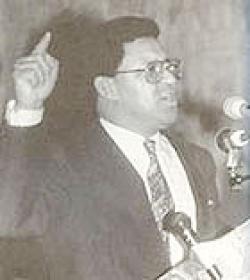
Published date
24 August 1998
Born in 1945 in the North West Cape, Boesak developed deep interests in religion and politics from an early age. At the age of 14 he became a sexton Dutch Reformed Church's Sendingkerk (a coloured offshoot of the white Dutch Reformed Church). He was ordained at 23, and at the age of 30 left for Holland where he would earn a doctorate in ethics. Upon his return to South Africa shortly after the 1976 Soweto uprisings, he increased his anti-Apartheid political activities. A dynamic public figure, Boesak quickly became one of movements the most popular leaders.
Boesack was one of the founders and prime movers of the United Democratic Front (UDF). By the mid 1980s the UDF umbrella housed over 700 organizations opposing Apartheid. It's members included some two million white, mixed-race, and black South Africans, and was the largest and most powerful legal opposition force in South Africa. Its membership and it's vision of a non-racial South Africa, approximated that of the then-banned African National Congress (ANC).
In the late 1990s Boesak, while chairman of the Western Cape branch of the ANC, was accused of misappropriating R 250,000 of funds received from the Danish investment group Danchurch Aid, the Coca Cola Foundation and the singer Paul Simon. Earmarked for development projects of Boesak's Foundation for Peace and Justice, the funds were allegedly transferred to a private trust fund. After police investigations, Boesak was charged with and found guilty on two counts of fraud in March of 1999. He was jailed in 2000 but was released in 2001, having served just over one year of his three-year sentence.
References
Los angeles times, "Allan Boesak",from Los angeles times,[Online], available at articles.latimes.com, [Accessed: 21 August 2013]|
News 24, "ARTICLES RELATING TO ALLAN BOESAK",from News 24, [Online], availbale at www.news24.com, [Accessed: 21 August 2013]